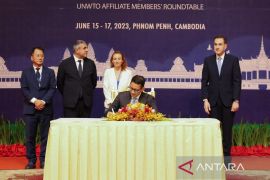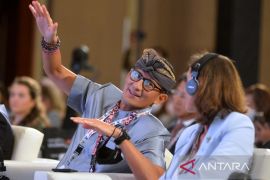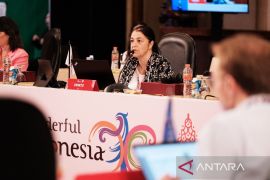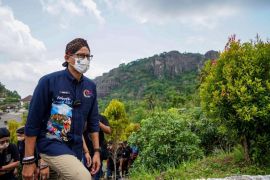Jakarta (Antara Bali) - Dubbed as "The Sunrise of Java," Banyuwangi, an East Java Provinces district, suddenly rose to fame on the world tourism stage when it was declared the first winner of a world tourism award in Europe.
Banyuwangis success at the prestigious tourism forum came as Indonesia won three awards of the United Nations World Tourism Organization (UNWTO) at a ceremony held in Madrid, Spain, recently.
According to a district government spokesman, the Banyuwangi administration with its "Re-inventing the Government in Tourism" project, emerged as the first winner for Innovation in Public Policy and Governance category of the 12th UNWTO Awards for Excellence and Innovation in Tourism.
It defeated candidates such as Colombia, Kenya and Puerto Rico.
Besides Banyungawi, other three categories were won by the Itaipu Technological Park (Brazil) in the UNWTO Award Innovation in Research and Technology category, the Treetop Walking Path (Lithuania) for the Innovation in Enterprises category, and the Sisterhood of Survivors Program (Nepal) for the Innovation in Non Governmental Organization category.
Garuda Indonesias Bali Beach Clean-Up campaign was the First Runner-up for the UNWTO Award for Innovation in Enterprises category.
Indonesias NGO, Karang Lestari Foundation, with its "Coral Reef Reborn" project was also the First Runner-Up for the UNWTO Award for Innovation in Non-Governmental Organizations (NGOs) category.
The Awards recognizing innovation in four categories - Public Policy and Governance, Enterprises, NGOs and Research and Technology - were announced on January 20 at the UNWTO Awards Ceremony at the Spanish Tourism Fair (FITUR) in Madrid.
The projects were selected from among more than 100 nominations from 30 countries.
"The UNWTO Awards aim to honor those that work for the benefit of host communities, supporting the livelihoods of local people and protecting our environment and our culture for future generations. All 16 finalists are an example to all of us of how the principles of the UNWTO Global Code of Ethics for Tourism and the objectives set in the Sustainable Development Goals (SDGs) can inspire sustainable tourism," UNWTO Secretary-General Taleb Rifai said.
The local government of Banyuwnagi lauded the UNWTO award.
"This award is very meaningful, not only for Banyuwangi but also for Indonesia. After all, a terror bomb attack took place recently at the Thamrin Boulevard in Central Jakarta. We have to maintain Indonesias tourism reputation in the eyes of the world," Banyuwangi Regional Government Secretary Slamet Kariyono said when contacted by Antara in connection with UNWTO award.
Slamet said the tourism sector in Banywangi over the past five years had continued to develop. The number of domestic tourists visiting the district jumped by 161 percent from 651,500 tourists in 2010 to 1,701,230 in 2015.
The number of foreign tourists arriving in the district of Banyuwangi also rose drastically by 210 percent from about 13 thousand in 2010 to 41 thousand in 2015. This data was obtained from hotels and tourism destination operators.
The growing tourism sector in this district was also reflected in the number of passengers at the Blimbingsari Airport in Banyuwangi, which rose by 1,308 percent from 7,826 in 2011 to 110,234 in 2015.
The tourism sector also contributed in boosting the local economy. Based on the data of the Central Bureau of Statistics (BPS), the per capita income of people in Banyuwngi increased by 62 percent from Rp20.8 million in 2010 to Rp33.6 million in 2014.
Head of Banyuwangis Cultural and Tourism Service MY Bramuda said that Banyuwangi was able to win the UNWTO award because the local government had successfully developed the local tourism. The regional government took four strategic steps to develop its tourism.
Firstly, he said, the local government transformed the region as a product whose tourism potential could be continuously promoted. "The bureaucracy served not only as a public servant but also as an agent of promoting tourism together with other tourism stakeholders," remarked Bramuda.
Secondly, the regional government applied the correct tourism strategy. It offered adventure and experiences different from those of other regions, nature tourism adventure, culture tourism and festival activities.
There are market segments that become the targets, namely women, young people and internet users. The three segments have large markets. The number of women in Indonesia reached 120 million, young people (of 16 to 30 years) number 62 million and internet users total 82 million.
"Therefore, the annual Banyuwangi Festival always presents specific segments based on the tourism market potential such as jazz music, traditional batik clothes, sports and others," stated Bramuda.
Thirdly, the regional government conducted consistent and continual innovations by creating new icons and destinations, such as developing the airport with a green concept, expanding Grand Watudodol and floating houses in the Bangsring areas, cooperating with state companies in the development of excursion ship piers at Boom Beach and many others.
Fourthly, the local government managed its tourism events through Banyuwangi festival events, thus introducing the local potential to the public and attracting tourists to Banyuwangi.
"The Banyuwangi Festivals have been held since 2012. This is an event based on sports, nature and cultural tourism, and continues throughout the year. In one year, 35 tourism activities are conducted," he added.
(WDY)









